What is an AI agent? A complete overview and guide

What is an AI agent?
An AI agent is a computer system that uses artificial intelligence (AI) to perform tasks on behalf of another user or system. This capability for agency allows the agent to make decisions and act autonomously in pursuit of the goals set for it, in addition to its capabilities for reasoning, planning, and memory.
AI agents are typically built on generative or foundation AI models, particularly large language models (LLMs). This equips them with natural language processing (NLP), which enables them to understand and respond to users in natural language, as well as process unstructured data and multimodal inputs like text, audio, code, and video.
Agents go far beyond the models they’re built on, however. They represent a new class of AI technology (agentic AI) that can perceive its environment, use tools like APIs, design its own workflow, even collaborate with other agents to solve complex problems — all with little to no human intervention.

Key characteristics of an AI agent
As mentioned above, what sets AI agents apart is their ability to reason and act autonomously. AI agents can be built with various capabilities to suit specific business functions, but their key characteristics include:
Reasoning: Agents use logic and available information to draw conclusions, make inferences, and solve problems. This core cognitive process also enables them to analyze data, identify patterns, and make informed decisions based on evidence and real time context.
Acting: They have the ability to take action and perform tasks based on their decisions, plans, or external input to achieve their goals. This can include updating data, executing workflows, or triggering other processes.
Observing: AI agents base their actions on the information they perceive, which leads them to gather information about the environment or scenario to make informed decisions. Perception can take various forms, such as computer vision, natural language processing, or IoT sensor data analysis.
Planning: AI agents can develop and follow a strategic plan to achieve complex goals. This intelligent, iterative process can include identifying the necessary steps, evaluating potential actions, and choosing the best course of action based on available information and defined goals—even considering the potential obstacles.
Collaborating: They can collaborate with humans or other AI agents to achieve complex tasks, even in dynamic or complex environments. This can require communication, coordination, and the ability to understand and respect other priorities.
Self-refining: Agents can learn and adapt from experience, adjusting their behavior based on feedback mechanisms to continuously improve performance over time. Mechanisms for iterative refinement can involve machine learning (ML) techniques, humans in the loop (HITL), or inputs from other AI agents.

Leverage omnichannel AI for customer support
How do AI agents work?
Much like a living organism, an AI agent operates by following a continuous cycle of observation, thought, and action. This process imitates how humans interact with the world: we see something, think about it, and respond.
This loop of sensing-thinking-acting enables agents to automate and perform a range of complex and open-ended tasks across business functions and industries.
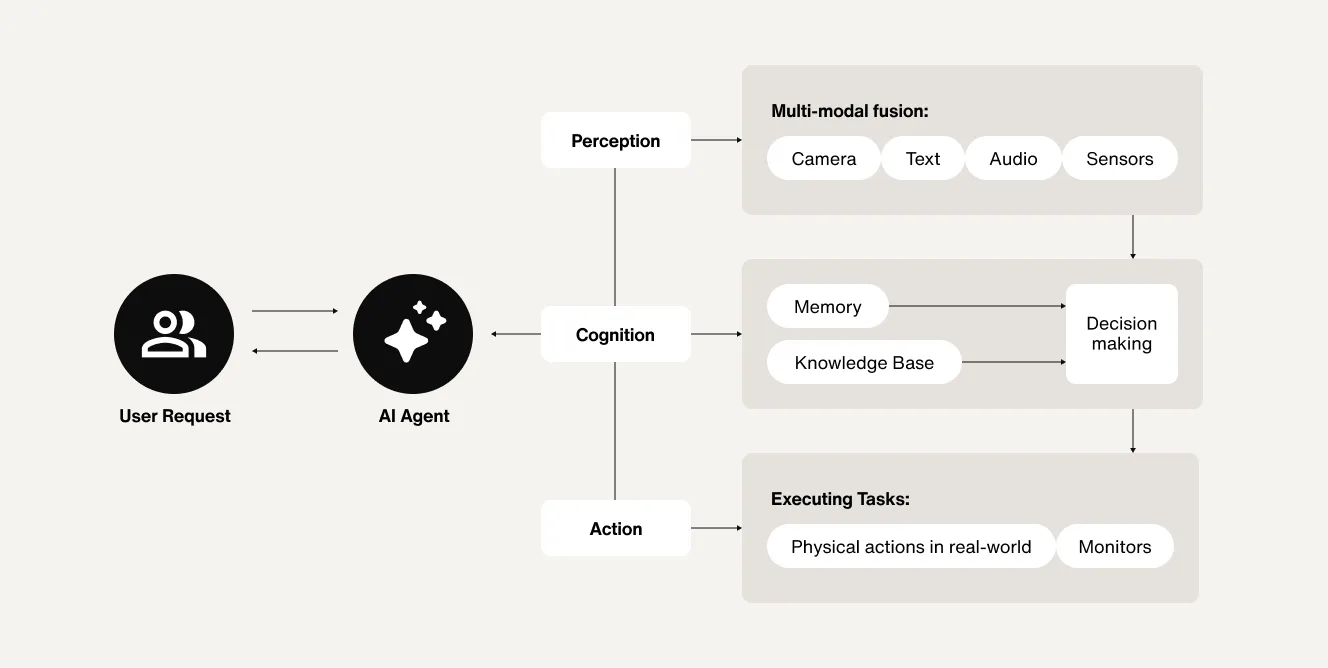
Even though AI agents work autonomously to achieve a task, they still require humans to define their goals, environment, rules, and available tools. This persona is defined by the developers who design and train the agent, enabling it to behave consistently within its assigned function.
Agents also rely on a set of interconnected components that work together to enable them to perceive their environment (observe), process information and make decisions (think), and take (action). These components can be thought of like parts of the human body, each doing its part to help the agent operate in its environment.
AI agents are built on large language models (LLMs)—which acts as the “brain” of the agent. The LLM provides the agent with the ability to understand, reason, and act, as well as process and generate language, and orchestrate its other core components in reasoning and action.
The core components of an AI agent include:
👀 Perception: The eyes
Agents process data from diverse sources to inform decision-making—such as user queries or APIs—often using natural language processing (NLP), computer vision, or sensors.
🧠 Reasoning and decision making: The prefrontal cortex
This module enables agents to use logic, evaluate possible outcomes, and make decisions using advanced machine learning algorithms.
💪 Action and tool calling: The muscles
Translates the agent's decisions into real-world interactions across systems, executing steps by calling on software integrations, APIs, or controlling physical devices.
💭 Learning: The memory
Enables the agent to store and recall past interactions, allowing it to learn through reflection to adapt to new situations, improve performance, and maintain context between user interactions.
🗨️ Communication: The voice
Enables the agent to interact with humans, other agents, or external systems by way of natural language generation or protocol-based messaging, which is key to collaboration in multi-agent systems.
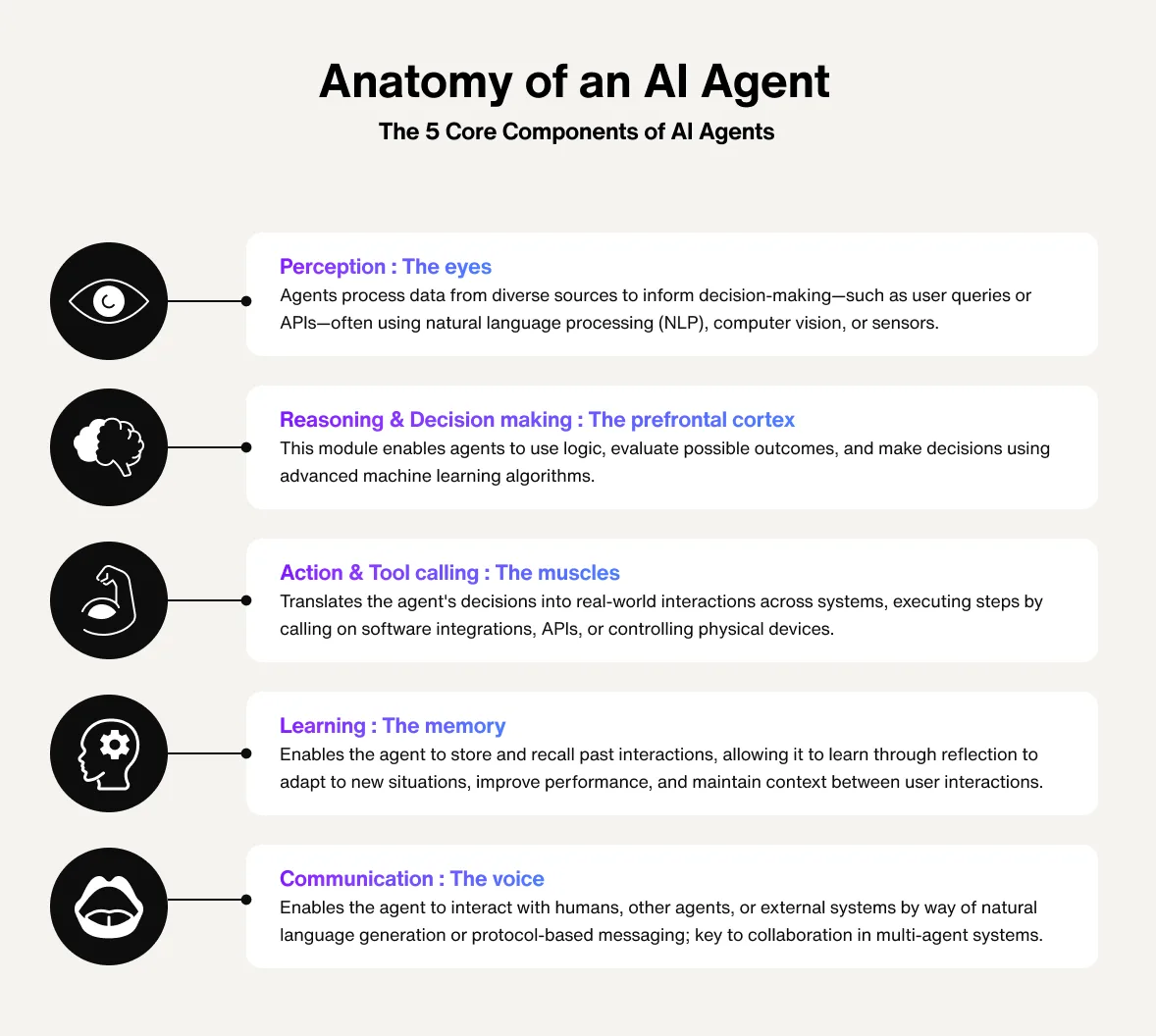

Leverage omnichannel AI for customer support
What is the difference between AI agents, AI assistants, and chatbots?
In short, the key differences between these AI technologies are their respective levels of autonomy, the complexity of the tasks they can handle, and their ability to learn and adapt.
AI agents have the highest autonomy and adaptability across any sort or task, AI assistants are agents designed to respond to user guidance, while chatbots are purely reactive, with minimal autonomy and limited adaptability. Learn more: AI agents vs chatbots: Key differences explained.
What are some different types of AI agents?
AI agents can be categorized by their capability, role, specialization, and the outcome they’re trained to deliver. Here is a list of some of types of AI agents being created today:
Based on interaction
One way to categorize agents is by how they interact with users. Some agents engage with users directly, while others operate in the background with limited to no human interaction:
Surface agents: Agents can be built as interactive assistants that help end-users with various tasks, such as answering common queries or recommending products. Usually query-triggered, they provide timely, tailored, and intelligent AI customer service across channels.
“Copilot” agents: These agents augment the productivity and capabilities of human users. Also known as smart assistants, they can help with creating content, writing code, or surfacing knowledge to streamline workflows and improve performance.
Background agents: These agents work behind the scenes to automate repetitive tasks, analyze data for insights, optimize processes, and proactively identify and address potential issues (as in AI-driven security). Also known as workflow agents, they are generally event-driven and perform single or multiple tasks in workflows, and can act as both orchestrators and executors.
Based on the number of agents
Single agent: Operate on their own to achieve a specific goal and are best suited for well-defined tasks that don't require collaboration with other agents. They use external tools and data to perform tasks and enhance their functionality as needed. However, they can only use one foundation model for processing.
Multi-agent: Multiple AI agents that collaborate or compete to achieve a common goal or set of objectives. Multi-agent systems leverage the diverse capabilities and roles of individual agents, orchestrating a team of of specialist agents to tackle complex tasks. Each agent can have different foundation models that suit their needs, and communicate and collaborate to achieve discrete tasks or even entire processes, as in a software development pipeline.
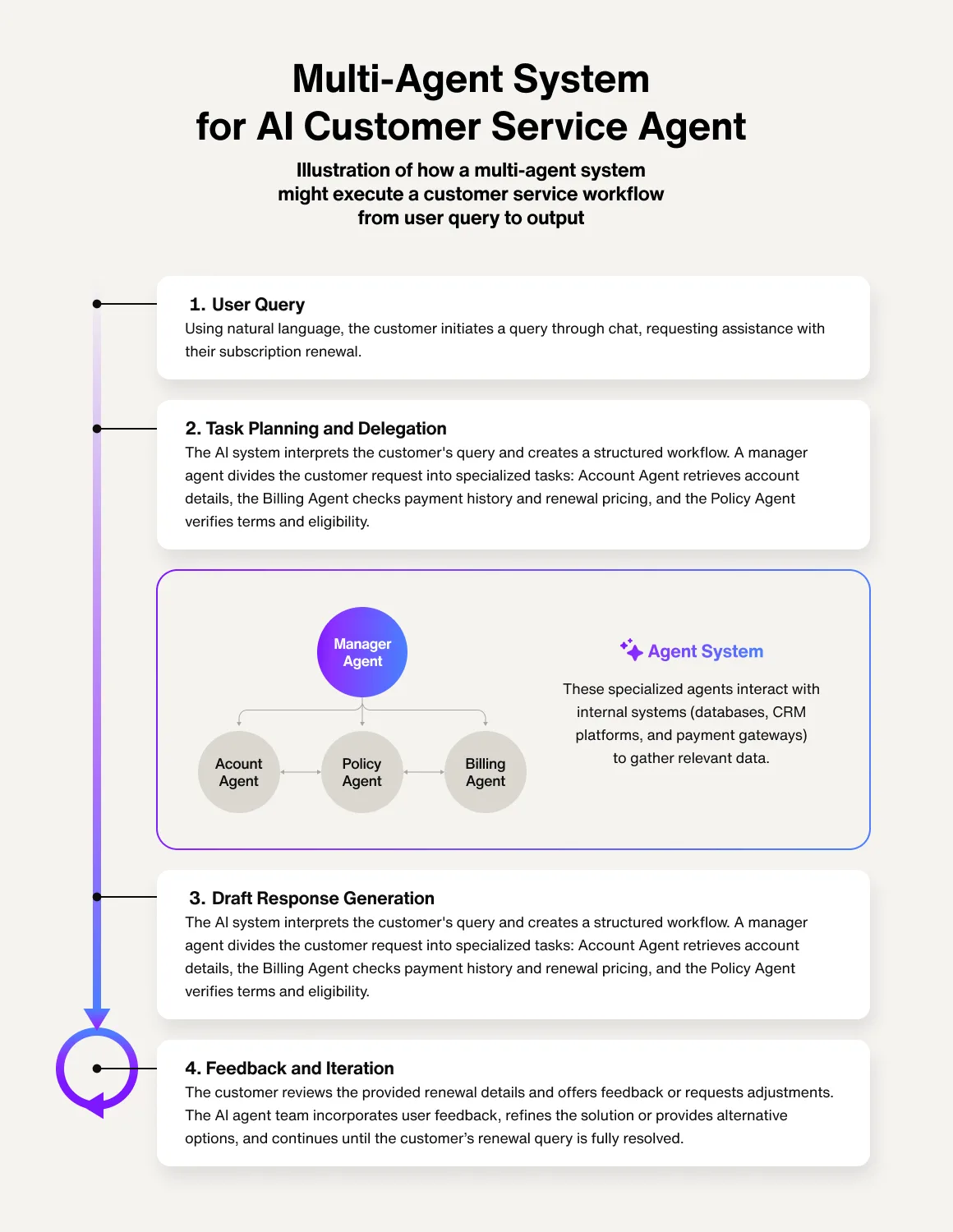
Level of specialization
Another way to categorize AI agents is by their level of specialization. Agents operate from the training data in their particular model, so agents that are custom-trained for specific roles or functions can lead to improved performance and computational efficiency.
Vertical AI agents: Purpose-built for specific industries or use cases, such as AI for customer service or agentic commerce. Trained on domain-specific datasets, they provide deep expertise and perform specific workflow with more accuracy and reliability than general-purpose agents. Teams of vertical agents with different roles and expertise can collaborate to solve complex problems in multi-agent systems.
Gen AI–native agents for domain solutions: Unlike vertical AI agents that layer AI into existing roles and workflows, these agents reimagine a particular domain with AI at the core of the solution. They’re purpose-built solutions for specific business domains or functions with AI at the core, such as AI-driven customer service systems or AI-enabled software development pipelines.
AI digital workers: These would function as employees, and so represent a potentially disruptive category of agents. These digital workers could function within an organization's current mode without requiring a full IT transformation, and might help capture value more quickly.
AI agents aren't mutually exclusive, due to the collaborative capabilities of multi-agent systems. Organizations can use a combination of agents to handle specific tasks, such as AI assistants to help employees with tasks, and AI customer service agents to automate support workflows.
Benefits of AI agents
AI agents can enhance the capabilities of language models by providing a degree of autonomy and adaptability. By interacting with the outside world in real time through tools and embodiment, they expand the scope of information and functionality available to AI systems, enabling model outputs to be applied intelligently and dynamically in complex environments.
This leads to many benefits such as:

8 major support hassles solved with AI agents
AI agents use cases
AI agents can be built and trained for various use cases, and organizations are already deploying them. For example, AI customer service has become commonplace on many customer-facing websites. According to research by McKinsey, organizations using AI customer service agents increased issue resolution by 14% per hour.
Use cases for AI agent can be grouped into six broad categories:
Customer agents
Customer agents deliver personalized customer experiences across all channels by understanding customer needs and recalling past interactions. They can answer questions, resolve issues, or recommend the right products or services. They integrate seamlessly into omnichannel web, mobile, email, SMS, or point of sale, or can be integrated into product experiences with voice or video.
Employee agents
Employee agents, or virtual assistants, boost human productivity and efficiency by automating repetitive tasks, streamlining processes, and surfacing knowledge to reduce errors. They can also generate, translate, and edit content to streamline operations and improve performance.
Data agents
Built for complex data analysis, these agents gather, analyze, and act on datasets. By finding and acting on meaningful insights in real time, they enable organizations to be more agile and data-driven.
Code agents
Code agents accelerate development by automating and streamlining tasks such as code generation, debugging, documentation, and testing, helping teams to deploy cleaner code in less time.
Creative agents
Creative agents enhance the creative process by generating content, images, and ideas in seconds. This helps to streamline and scale creative workflows, leading to more tailored, effective marketing campaigns, novel content, and greater innovation.
Security agents
These agents strengthen the security posture of organizations by automating the process of detecting, preventing, and remediating cyber attacks. By continuously monitoring network traffic for deviations from the baseline, they enable a more proactive, effective approach to combating cyber attacks and data breaches.
Commerce agents
Commerce agents act on behalf of users to research, plan, compare, and execute purchases end-to-end—also known as agentic commerce. By interpreting intent, accessing various data, and acting in real time, these agents connect consumers to brands via autonomous action. They're increasingly popular for use cases like AI in travel or AI in retail.
Pro tip: Agents can work with different AI models, depending on their role. For instance, an AI concierge would require an LLM to interact with users in natural language. However, a manager agent that coordinates agentic AI workflows in a manufacturing facility might not require language capabilities because it’s not user-facing. Instead, it could use a specialized model for its decision-making process.

8 major support hassles solved with AI agents
AI agents examples and case studies
The following AI agent examples from leading enterprises serve as a useful case study on AI agents in real-world applications:
AI agents for marketing
The hotel chain Marriott uses Adobe's Experience Platform Agent to streamline its marketing process. The purpose-built AI agents helped Marriott achieve a 70% reduction in time to market for campaign content generation while enhancing personalization at scale.
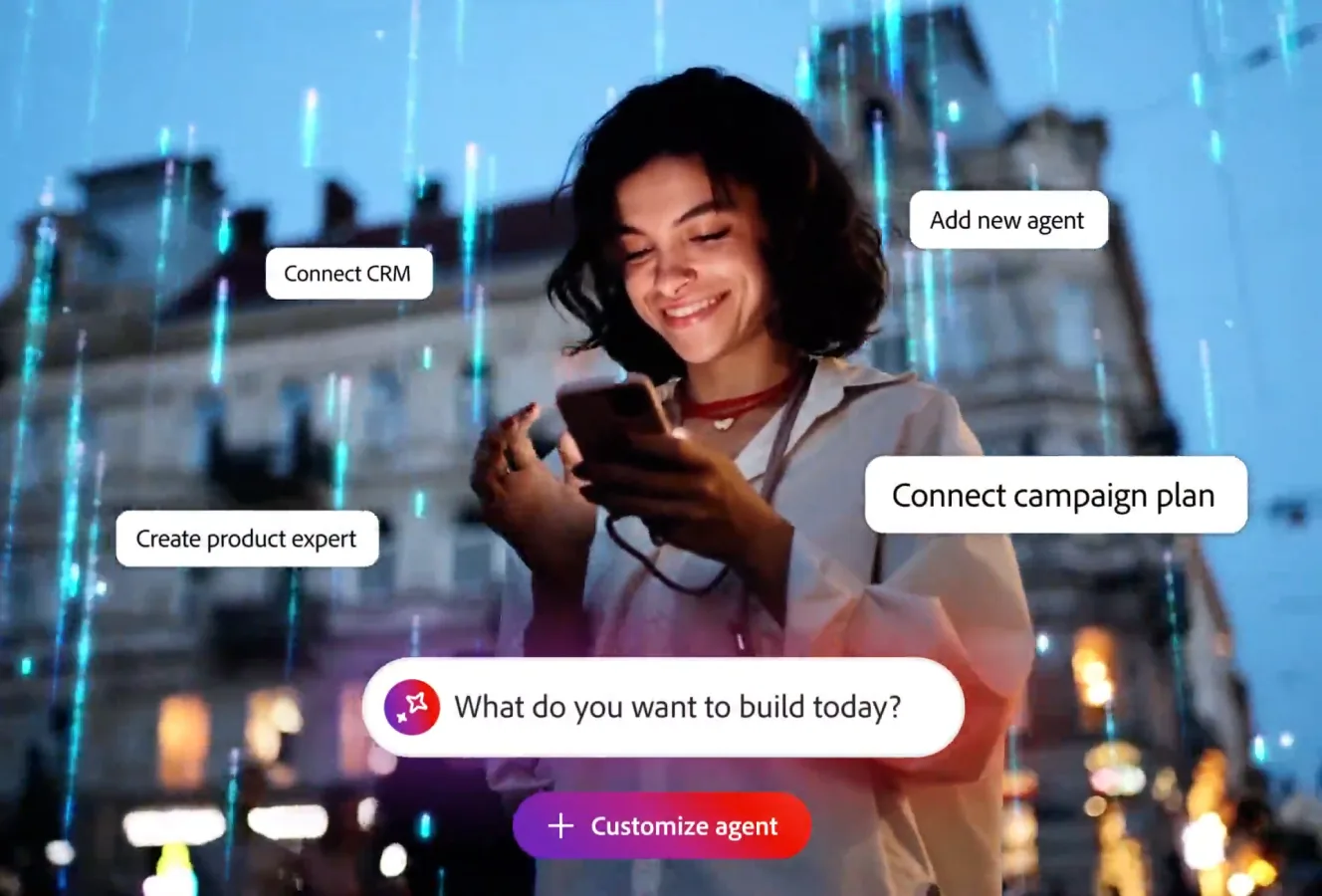
AI agents for healthcare
Mayo Clinic partnered with Microsoft to improve the accuracy of medical diagnoses and personalized medicine with generative AI and multi-agent systems. Early reports show models can more effectively predict patient issues by identifying patterns across datasets, leading to better health outcomes and operational efficiency.

AI agents for software engineering
The technology company Lenovo has deployed AI agents for both software engineering and AI for customer service, according to McKinsey. Software engineers at Lenovo reported 15% improvements in efficiency, and call center teams saw 15% productivity gains in call handling time.

AI agents for customer service
Lotte Homeshopping, a Korean mega-retailer, built an AI concierge using Sendbird’s AI agent platform and Anthropic’s Claude 3.5 Sonnet LLM. According to Lotte’s AI team, “Sendbird’s accuracy and flexibility, paired with Claude, solved the problems others couldn’t.” Specifically, Lotte reduced customer service inquiries by 40% without sacrificing enterprise-grade security, compliance, and scalability.

Challenges and risks of AI agents
For all the benefits of AI agents, there are some potential risks and challenges associated with their use. These include:
Building trust: Building trust among customers, employees, and stakeholders is a big hurdle in adopting AI agents. People must trust AI enough to hand off tasks, however, the “black box” nature of AI decision-making raises concerns about its risks and reliability. Organizations must address how AI decisions are made and monitor performance for biased or unethical outputs to secure trust.
Change management: Scaling AI agents will disrupt traditional workflows and require careful change management. To get full value, organizations must invest in training, communication, and stakeholder buy-in to enable a smooth transition to new agent-driven workflows.
Data protection: AI requires extensive data access to operate, which raises significant privacy and compliance concerns. Organizations must implement rigorous role-based controls for security, operations, and data to mitigate risk and ensure compliance with emerging data regulations.
Resource-intensive applications: Developing and deploying AI agents can require substantial development and computational resources, potentially straining budgets and existing IT infrastructure for organizations with limited resources.

Leverage omnichannel AI for customer support
Best practices for adopting AI agents
Leaders can focus on three important areas as part of a well-crafted AI strategy to turn AI agent initiatives into successful solutions:
Incorporate controls: Any deployment of AI agents should include strong controls, as unmonitored agents can produce inaccurate, biased, or inefficient outputs. Implement feedback loops, safeguards, hallucination detection, and agent collaboration patterns—like critic agents refining outputs or escalation to human managers—to ensure accuracy, ethics, and improvement without risk.
Focus on high-value use cases: Small-scale AI projects tend to lead to small returns. To maximize impact, focus on high-value, high-tech challenges where AI agents can drive meaningful transformation and justify the investment.
Anticipate the demands of transformative tech: The rise of AI agents could lead to a shift in IT architectures, requiring organizations to invest in talent, reskilling, and new AI-centered IT operating models to scale agents. It’s best to get ahead of these potential changes in capital, technology, and human resources, especially given an ongoing shortage of AI talent.
Related reading: How to craft an effective AI strategy
How to build and implement AI agents
Deploying AI agents is increasingly feasible for organizations across industries. Over the past 18 months, AI leaders like Google, Microsoft, OpenAI, and others have released software libraries and frameworks that support agentic functionality. Meanwhile, AI agent technology continues to evolve, with tools like Microsoft CoPilot and Google’s (forthcoming) Project Astra making LLM-powered AI agents available for various use cases. In short, AI agents are moving from experimental to operational at a rapid pace.
While there is discussion that scaling AI agents effectively may soon necessitate a shift in IT architectures (see the FAQ below)—tech leaders can deploy agents within their current environments in a few ways:
Custom AI agents
Organizations can build highly tailored AI agents by fine-tuning pre-trained LLMs for specific use cases, like AI-driven customer service systems. For instance, a support team might create an AI agent trained on customer histories, call center transcripts, and internal policies to assist staff in handling inquiries more efficiently, even proactively.
Custom-build agents can be costly. However, there’s a growing market for AI agent platforms like Sendbird that make it easy for non-technical teams to create, test, and optimize custom AI agents without sacrificing security, compliance, or scalability.
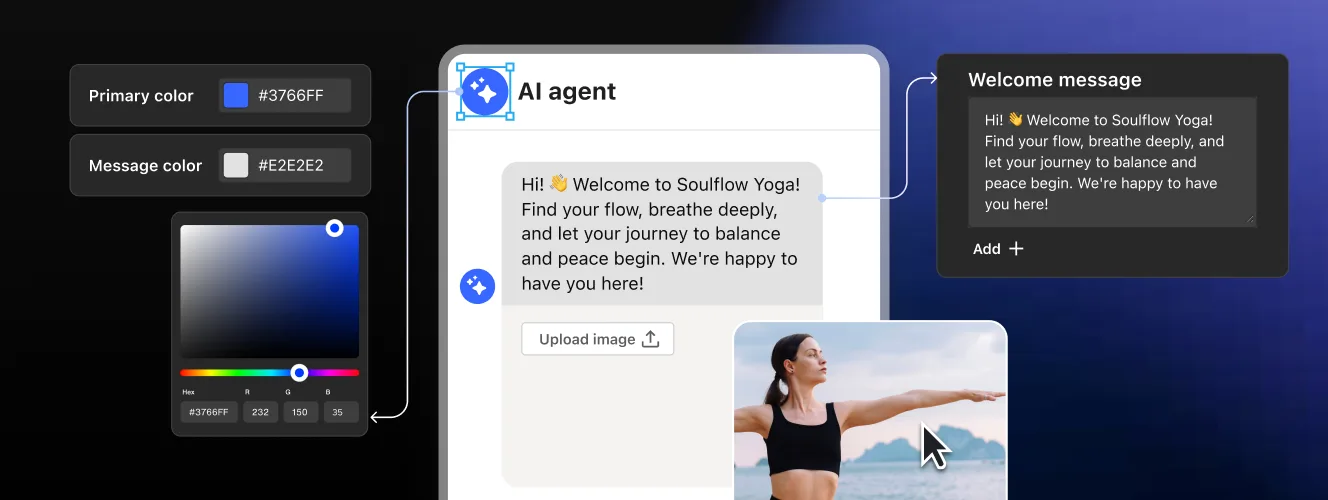
AI wrappers
AI wrappers serve as secure intermediaries that allow business systems to interact with third-party services via APIs without exposing sensitive internal data. A bank, for example, might wrap its proprietary credit risk model in an AI layer that enables external large language models (LLMs) to generate insights without ever accessing the underlying customer data to effectively mitigate risk.
Super platforms
Super platforms are next-gen business apps, such as CRMs, with embedded AI agents. These platforms, such as AgentForce by Salesforce, streamline operations by automatically interacting with internal tools. For example, a user could generate a sales report that pulls data from analytics systems, eliminating the need for custom code or manual processes.
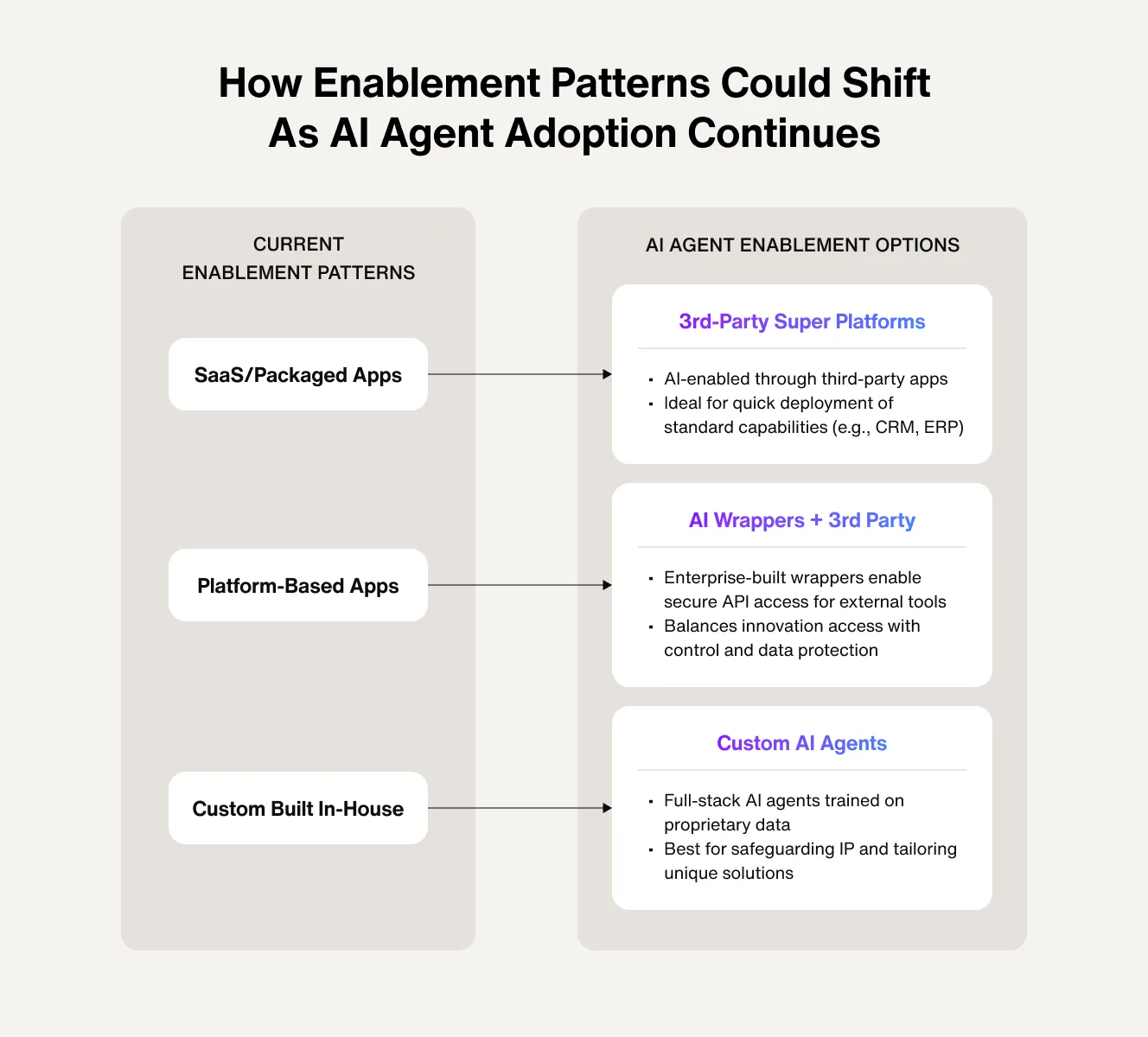
Learn more: The 8 key steps to build an AI agent

8 major support hassles solved with AI agents
The future of work with AI agents
AI agents promise to do a lot of thinking and working on behalf of organizations of all sizes and industries. They can help to streamline operations, improve customer experience, improve decision-making, and more.
Amidst growing adoption of AI agents, organizations are moving from experimenting with AI agents to operationalizing them. One day, we may outsource the majority of tasks to AI as part of an AI agent-to-agent economy that saves businesses and consumers significant time and resources. However, the evolution of AI agents has only just begun, with many discoveries and improvements to come.
In the meantime, Sendbird makes it easy to build, train, and optimize AI agents for customer service.
Our trusted AI agent platform offers a straightforward AI agent builder. This way, non-technical teams can design and deploy omnipresent AI agents that provide proactive, personalized, and perfectly timed support—across every channel.
To ensure responsible AI at scale, every agent includes robust trust and safety capabilities like AI SOPs, AI agent evaluation, multi-locale support, activity logs for transparency, and more.
Enjoy a free subscription to Sendbird Desk, our best-selling chat helpdesk platform, when you sign up to build an AI agent.
Contact our friendly team of AI experts to watch a demo and learn more.











